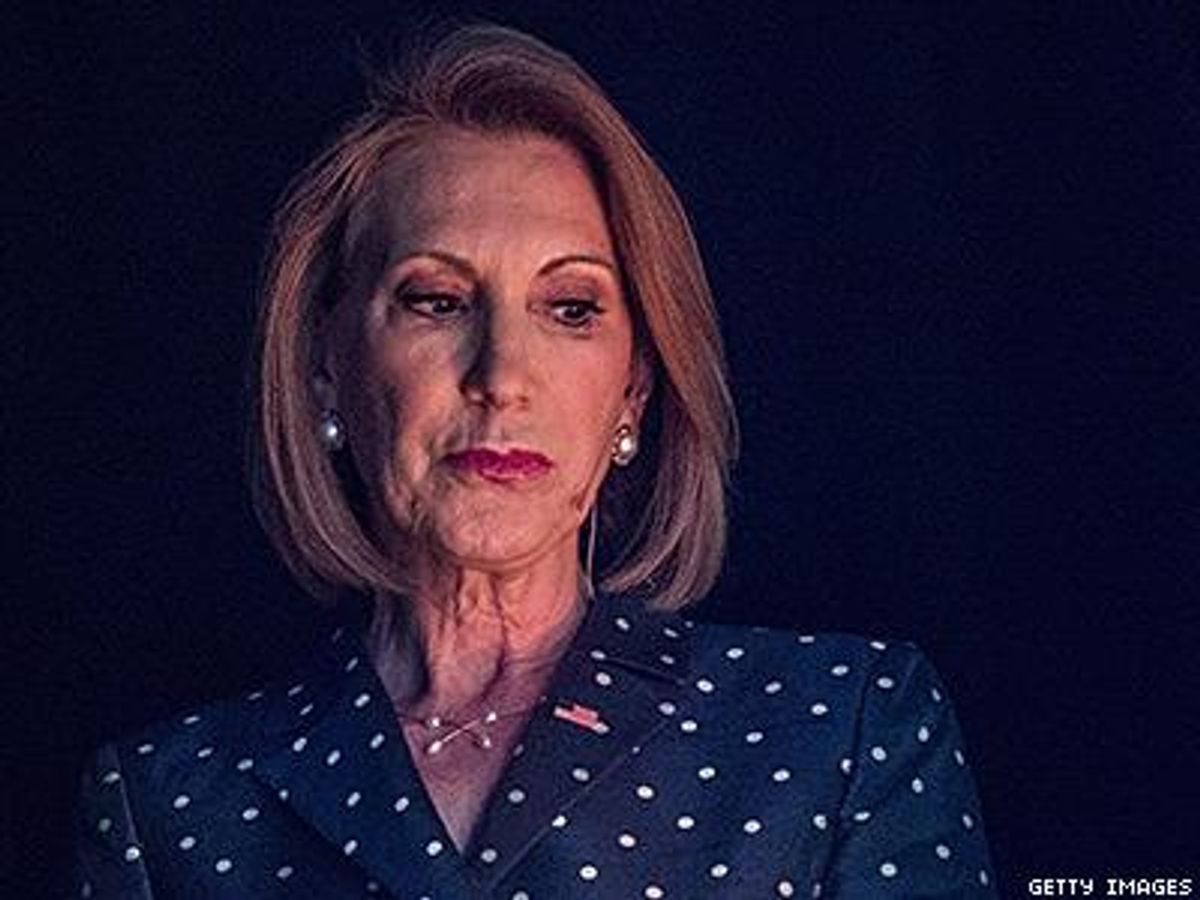Former Hewlett-Packard CEO and presidential hopeful Carly Fiorina just distinguished herself from her fellow GOP candidates for the White House in 2016 -- by indicating she would reluctantly accept a Supreme Court ruling bringing marriage equality to all 50 states.
In a reversal from her previous position, Fiorina told conservative Iowa blog Caffeinated ThoughtsThursday that she no longer supports efforts to amend the U.S. Constitution to ban same-sex marriage.
"I think the Supreme Court ruling will become the law of the land, and however much I may agree or disagree with it, I wouldn't support an amendment to reverse it," Fiorina said on-camera in the video posted Saturday. "I very much hope that we would come to a place now in this nation where we can support their decision and at the same time support people's right to have, to have, to hold religious views and to protect their right to exercise those views."
Back when Fiorina was a candidate for U.S. Senate in California in 2010, she said she supported the idea of an amendment to the U.S. Constitution to ban same-sex marriage, notes LGBT blog The New Civil Rights Movement. Fiorina was also vocal in her support of California's Proposition 8, which revoked marriage equality in the state until it was ultimately overturned as unconstitutional by federal courts.
But even with this shift toward a more tolerant -- if not celebratory -- tone on marriage equality, Fiorina stands out as the "most respectful and sympathetic" GOP candidate regarding LGBT rights, Log Cabin Republicans executive director Gregory Angelo told the Washington Blade.
Indeed, among the already-crowded field of candidates vying for the Republican presidential nomination, the vast majority are in favor of amending the U.S. Constitution to ban same-sex marriage outright.
Texas Sen. Ted Cruz, the first candidate to enter the race, has been such a staunch advocate of the approach that he's repeatedly introduced legislation in the Senate that seeks to ban all federal recognition of such marriages. Lest anyone thought the Tea Party favorite would soften his antigay views on the campaign trail, Cruz's first campaign stop in Iowa included a rant about the "radical gay marriage agenda," in addition to reiterating his support for an antigay federal constitutional amendment.
Former Arkansas Gov. Mike Huckabee has not directly discussed Cruz's antigay bill, but he has repeatedly (and mistakenly) asserted that states and lawmakers can simply ignore pro-equality rulings from federal courts. When a federal judge struck down Arkansas's ban on same-sex marriage in January, Huckabee called for the judge to be impeached. When Huckabee announced his campaign last month, his speech included a thinly veiled warning to the Supreme Court, reminding the nine justices that "they cannot overturn the laws of nature or nature's God."
Retired neurosurgeon Ben Carson, who announced his candidacy on the same day as Fiorina earlier this month, also believes that the president is not required to abide by a pro-equality ruling by the U.S. Supreme Court. An outspoken believer in impeaching judges who rule for LGBT equality, Carson Sunday reiterated his incorrect conclusion that the president can pick and choose which Supreme Court rulings he follows.
Kentucky Sen. Rand Paul, often painted as the "libertarian" candidate among the GOP presidential hopefuls, in March said that legal same-sex marriage "offends" him, then later that month proposed that same-sex couples be offered some sort of "contract" to solemnize their relationships. Paul has not commented on Cruz's so-called State Marriage Defense Act but has repeatedly told reporters that he believes determining marriage laws is an issue best left to the states.
Florida Sen. Marco Rubio has adopted the same position as Paul, making his own headlines after he admitted, when pressed, that he would attend the same-sex wedding of a friend, even though he "disagrees" with that person's "decisions." Rubio, who graduated with honors with a law degree from the University of Miami, claimed in January he does not believe courts "have the power" to rule on whether legal marriage should be available to same-sex couples.














































































